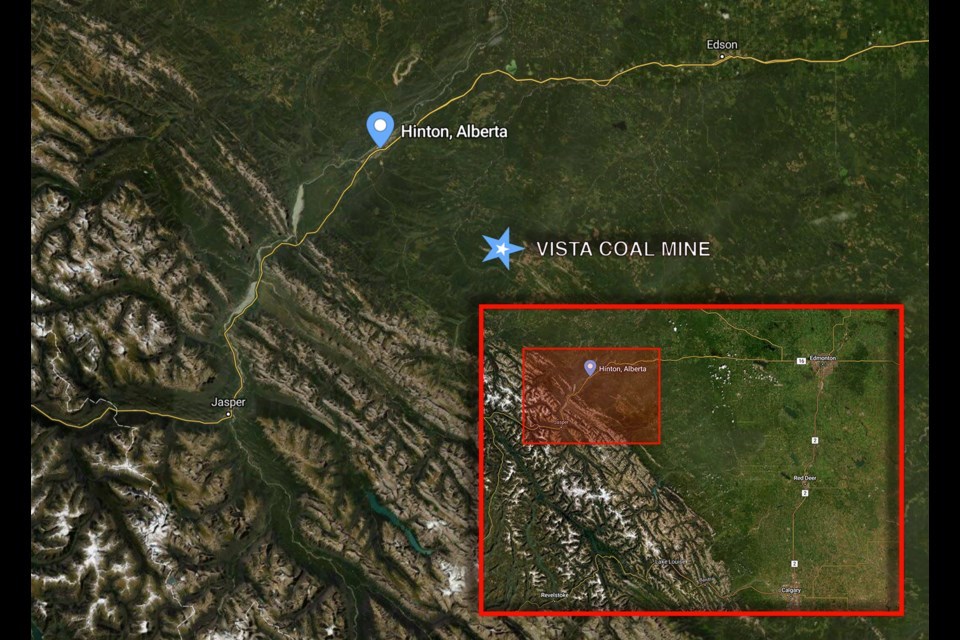A mine development proceeding without permits federal officials say are needed is at the heart of a Canadian non-profit environmental law organization’s request for the Department of Fisheries and Oceans (DFO) to start an investigation.
Coalspur Mines’ Vista Coal Mine near Hinton has proposed two expansions, both of which were previously subject to federal environmental assessments called impact assessments. In October, the Supreme Court of Canada said that the Impact Assessment Act is unconstitutional, leaving a gap in environmental legislation that hasn’t been patched up.
“The federal government needs to go back and fix it,” said Ecojustice lawyer Dan Cheater.
“Certain assessments – including the one for the Vista expansions – was ended at that point. And so, as a result, the expansions are not subject to federal assessment, but we do have all of this knowledge gained through the initial assessment process about the likely impacts of the expansions, and where other federal agencies need to give permits. One of those is this issue about impacts to fish and fish habitat.”
Waterways in the area are habitat for the bull trout as well as the endangered Athabasca rainbow trout, an at-risk federally protected fish species. According to the province’s Fish Sustainability Index, all Athabasca Rainbow Trout watersheds were assessed as either low or very low abundance of adult fish as of 2017.
The main threats to the sustainability of the species include heavy land use and development and changes to surface and groundwater flow, plus stream fragmentation. One of the proposed expansion projects is an underground test mine, so it would be difficult to know the full story of what’s happening below the surface.
The other proposed expansion would essentially double the size of the original mine. Together, they would make Vista the largest thermal coal mine in North America. Once completed, the mine would increase its coal processing plant production capacity to 7.572 million tonnes per year for a period of three years with an unspecified increase in the total amount of coarse and fine tailings disposed as well.
Compounding the issue is Alberta’s current drought, said Jesse Cardinal, executive director of Keepers of the Water, an Indigenous-led non-profit organization.
“A lot of lakes and rivers are at 50 per cent or less of what they normally are,” she said, speaking to how large energy projects also divert large amounts of water from waterways.
“That's concerning because it was already impacting spawning areas. The bull trout likes fresh water; they need cold water to survive. In order for the water to be fresh, it needs to be at a certain level. Now that we're in a drought, this project definitely needs to be looked at. The feds need to step in and actually take foot onto this site and have a look at what are we dealing with in terms of water levels right now.”
A 2021 analysis report from the Impact Assessment Agency of Canada cites the DFO as indicating that the development would require a Fisheries Act authorization and might also require a Species at Risk Act permit.
The DFO has already confirmed that both expansions will have serious impacts that threaten the ongoing survival of all fish in the area and that Coalspur Mines, Cheater said.
Ecojustice previously wrote two letters to the DFO on behalf of Keepers of the Water and the West Athabasca Watershed Bioregional Society requesting that the federal agency step up and enforce the rules before the waterway and the fish suffer the brunt of the development’s aftermath. There was concern that work might begin before the permits were in place.
That concern was well-founded.
Cheater said that the Alberta Energy Regulator (AER) confirmed that Coalspur did start work on the underground project in mid-January. The company has received all necessary provincial permits for the test mine.
The work can proceed because Coalspur has not commenced mining activities at the Vista Test Underground Mine, confirmed Lauren Stewart, a media representative for the AER, via email.
“We've written again to the DFO and said that what we were worried would happen has in fact happened, and now impacts are imminent or may have already occurred,” Cheater said.
The DFO has confirmed receipt of the letter, but the federal government is not ensuring that impacts to federal jurisdiction don't happen before there is a process in place to understand those impacts and mitigate them, he says.
“There was a federal assessment, but that's no longer the case. That doesn't mean the federal government can sidestep their obligations to protect environmental matters that are in their jurisdiction, which include species at risk, it includes fish and fish habitat. I think the real issue is the federal government – and the DFO in particular – not taking action to investigate what's happening and enforce their laws.”
The Fitzhugh sent an email to Coalspur’s community address as listed on the Hinton Chamber of Commerce’s website to request an interview. The email was returned undeliverable.
A representative from the DFO was not available by press time.




